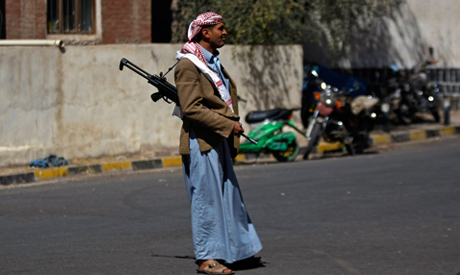Date: Wed, 18 Feb 2015 13:56:33 +0100

Ahram Hebdo: What do you think of the Egyptian stance regarding the situation in Yemen?
Ali El Shaabany: The Egyptian stance is strong and courageous, and was warmly welcomed in the Yemeni street.
In his press conference with Russian president Putin [last] Tuesday in Cairo, El-Sisi said that Egypt supported the political solution in Yemen and stood strongly by Yemeni unity.
This Egyptian-Russian stance showed that they are a challenge to foreign conspiracies [sic] that target Yemen's security, stability and unity, and cause tensions over vital strategic interests in the region, such as the strait of Bab El-Mandab and international waters.
These require international support for Yemen, to ensure security and political stability in the country and so that the vital interests of the Gulf states and Egypt are no endangered, whether the new Suez Canal or the movement of oil tanks and goods to and from Gulf states and the Middle East.
AH: [At the moment in Yemen], the Houthis hold power on the ground, but the tribes and political forces refuse this reality. What is the solution?
El Shaabany: A lot is going on in Yemen at the moment, in terms of the balance of power. The Houthis are not in control of everything, they just control the Yemeni people. The army, the security forces and the institutions are all doing their job as normal, and they are backed by people's committees that are made up of different components in order to assist the army in enforcing security and stability.
AH: South Yemen is calling for independence. Will it become independent? And what is President Ali Nasser Mohamed's stance on what is happening in Yemen?
El Shaabany: Let's call this a secession, not any [independence from an] occupation, as South Yemen is a part of Yemen. The people in the southern provinces are in favour of unity and whoever says otherwise is delusional and a liar.
Everyone in and outside Yemen needs to realise that Al-Qaeda in the Arabian Peninsula (AQAP) will be the first to benefit from the South's secession. They have repeatedly tried to build up an Islamic emirate in many provinces in the south.
Political forces such as the Southern Movement have not been able to form a united leadership since 2007.
As for former [South Yemen] president Ali Nasir Muhammad Husani's stance, I would prefer to refer the question to him. But his known political stance is that he is in favour of [Yemen's] unity.
AH: Do you think that Gulf states will interfere -- especially Saudi Arabia, who aims to stop Shiite expansion and whose officials lately stated that they had reinforced the presence of their forces at the border?
El Shaabany: [Saudi Arabia] is not in favour of interfering or engaging in combat with any party in Yemen, due to the specificity of its political scene and to the complicated nature of its tribal society.
Saudi Arabia would never rush into direct military intervention.
If the kingdom were forced to intervene, it would only intervene economically, as Saudi Arabia is the largest donor to the Yemeni state.
According to sources, Saudi will reconsider its funding to tribal groups that are affiliated with the Muslim Brotherhood, as in this way Saudi Arabia could contribute to the creation of an even more brutal and dangerous new Islamic State group in the region.
AH: Do you think a foreign military intervention might take place?
El Shaabany: I don’t think that a foreign military intervention will take place, because the consequences would be unbearable for the international community and would affect international strategic interests.
The Yemeni people are armed, tribal and stubborn, and would not accept any foreign assault on their land. [If there were a foreign military intervention,] Yemen would become a global concern, especially in view of international strategic interests such as the maritime routes...
Iran's role in Yemen is strengthening by the day, especially in view of the erroneous policies of countries of the regional axis.